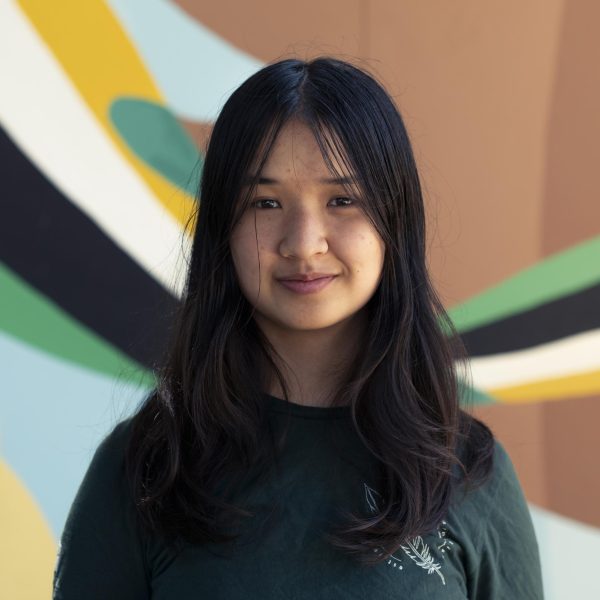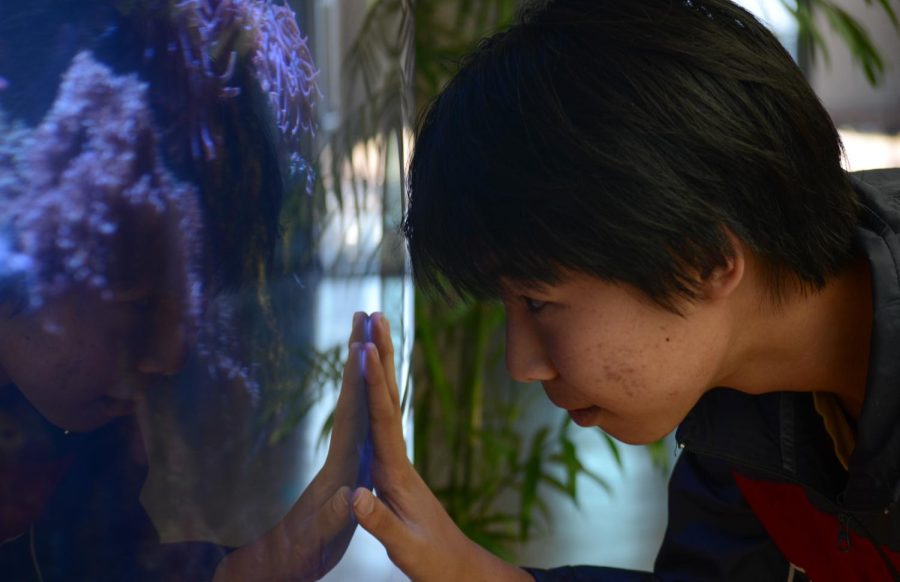Humans of Harker: Tides of curiosity
Benjamin Tian dives into mysteries of marine biology through research and coding
“My favorite part of computer science is having the ability to create solutions. Computer science is a very complicated subject, so trying to navigate and combine concepts to create solutions. Computer science taught me how to learn on my own or find solutions on my own because it’s very complex,” Benjamin Tian (’23) said.
In the ocean’s depths, the eerie glow emanating from bioluminescent creatures remains the only respite from total darkness. Despite the Challenger Deep in the Mariana Trench extending seven miles below the surface with pressures a thousand times greater than on the surface, life persists and even thrives in this alien and largely unexplored environment. Benjamin “Ben” Tian (’23) remembers how learning about the Challenger Deep in middle school ignited wonder about the oceans and the mysteries of the deep sea within him.
“The first submarine to go to the bottom of the ocean was really interesting because the submarine has to have a lot of pressure and has to withstand a lot of pressure, and it was the first time ever seeing the bottom of the ocean,” Ben said. “It inspired a lot of curiosity. A lot of the deep sea is unknown to a lot of people, and that’s really interesting.”
Ben’s love of marine biology blossomed in middle school as he researched how to best care for his pet betta fish. Since then, his interest has only expanded. But what started as a quest for information to take care of his fish blossomed into a passion for discovering new knowledge about marine life.
“Back in eighth grade I was like, ‘I’d like to try to keep a fish.’” Ben said. “I got a fish, and I got really interested in how to take care of the fish, so I got more into researching it, and it gradually got really interesting.”
Last summer, Ben traveled to Cornell’s Shoals Marine Laboratory on Appledore Island in Maine to learn about marine biology, where he dissected sharks which had been bycatch and learned how to conduct research.
“We went onto an island, and there, we went offshore and we went shark fishing and learned about different types of sharks,” Ben said. “I shadowed with a professor there, and I worked with her on the research. There are very difficult, rigorous tasks. We had to wake up at 4 a.m. to go out to the beach.”
Ben’s research projects started with him building his own automatic fish feeder in middle school and have expanded in complexity and impact since then. After learning about artificial intelligence, Ben sought to combine marine biology with computer science, creating an app to identify the species of fish using neural networks. The intellectual curiosity that drives Ben in his research shines through to upper school economics teacher Sam Lepler.
“Ben is very intelligent, so he’s able to figure things out,” Lepler said. “He’s interested in learning not just the surface level of things, but really understanding what’s underneath, understanding the mathematical connections and the real world connections.”
Through diving into both marine biology and programming, Ben challenged himself to discover solutions to such technical problems and make new discovers and hopes to continue this pursuit of knowledge into the future.
“My favorite part of computer science is having the ability to create solutions,” Ben said. “Computer science is a very complicated subject, so trying to navigate and combine concepts to create solutions. Computer science taught me how to learn on my own or find solutions on my own because it’s very complex.”
In both his research and personal life, Ben constantly reflects on how his actions impact his environment. Close friend Mir Bahri (’23) admires his commitment to protecting the natural world.
“Ben cares a lot about the environment, which is really amazing,” Mir said. “I remember in middle school and upper school, whenever we’d go out to eat, he would refuse to be anywhere that serves plastic straws or plastic forks or spoons. That’s really indicative of his dedication and his passions to the things that he cares so much about.”
Ben’s devotion to his personal values extends beyond environmentalism to all aspects of his life. Close friend Dyllan Han (’23) appreciates Ben’s upright principles as well as his care for his friends.
“Ben is uniquely honest and consistent with his principles, and when he describes himself, or when he says an opinion, it’s not just an opinion; it’s actually something that he lives by,” Dyllan said. “I now see him as one of the most emotionally mature people I’ve met. He’s very compassionate, and he’s really opened up. He’s one of the best people to have a conversation with at school.”

-Lindsey Tuckey (11) is the co-conservatory editor for the TALON Yearbook, and this is her third year on staff. This year, she hopes to explore people's...


















![“[Building nerf blasters] became this outlet of creativity for me that hasn't been matched by anything else. The process [of] making a build complete to your desire is such a painstakingly difficult process, but I've had to learn from [the skills needed from] soldering to proper painting. There's so many different options for everything, if you think about it, it exists. The best part is [that] if it doesn't exist, you can build it yourself," Ishaan Parate said.](https://harkeraquila.com/wp-content/uploads/2022/08/DSC_8149-900x604.jpg)




![“When I came into high school, I was ready to be a follower. But DECA was a game changer for me. It helped me overcome my fear of public speaking, and it's played such a major role in who I've become today. To be able to successfully lead a chapter of 150 students, an officer team and be one of the upperclassmen I once really admired is something I'm [really] proud of,” Anvitha Tummala ('21) said.](https://harkeraquila.com/wp-content/uploads/2021/07/Screen-Shot-2021-07-25-at-9.50.05-AM-900x594.png)







![“I think getting up in the morning and having a sense of purpose [is exciting]. I think without a certain amount of drive, life is kind of obsolete and mundane, and I think having that every single day is what makes each day unique and kind of makes life exciting,” Neymika Jain (12) said.](https://harkeraquila.com/wp-content/uploads/2017/06/Screen-Shot-2017-06-03-at-4.54.16-PM.png)








![“My slogan is ‘slow feet, don’t eat, and I’m hungry.’ You need to run fast to get where you are–you aren't going to get those championships if you aren't fast,” Angel Cervantes (12) said. “I want to do well in school on my tests and in track and win championships for my team. I live by that, [and] I can do that anywhere: in the classroom or on the field.”](https://harkeraquila.com/wp-content/uploads/2018/06/DSC5146-900x601.jpg)
![“[Volleyball has] taught me how to fall correctly, and another thing it taught is that you don’t have to be the best at something to be good at it. If you just hit the ball in a smart way, then it still scores points and you’re good at it. You could be a background player and still make a much bigger impact on the team than you would think,” Anya Gert (’20) said.](https://harkeraquila.com/wp-content/uploads/2020/06/AnnaGert_JinTuan_HoHPhotoEdited-600x900.jpeg)

![“I'm not nearly there yet, but [my confidence has] definitely been getting better since I was pretty shy and timid coming into Harker my freshman year. I know that there's a lot of people that are really confident in what they do, and I really admire them. Everyone's so driven and that has really pushed me to kind of try to find my own place in high school and be more confident,” Alyssa Huang (’20) said.](https://harkeraquila.com/wp-content/uploads/2020/06/AlyssaHuang_EmilyChen_HoHPhoto-900x749.jpeg)



